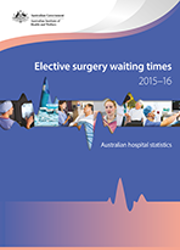Elective surgery waiting times 2015–16: Australian hospital statistics
Citation
AIHW
Australian Institute of Health and Welfare (2016) Elective surgery waiting times 2015–16: Australian hospital statistics, AIHW, Australian Government, accessed 19 April 2024.
APA
Australian Institute of Health and Welfare. (2016). Elective surgery waiting times 2015–16: Australian hospital statistics. Canberra: AIHW.
MLA
Australian Institute of Health and Welfare. Elective surgery waiting times 2015–16: Australian hospital statistics. AIHW, 2016.
Vancouver
Australian Institute of Health and Welfare. Elective surgery waiting times 2015–16: Australian hospital statistics. Canberra: AIHW; 2016.
Harvard
Australian Institute of Health and Welfare 2016, Elective surgery waiting times 2015–16: Australian hospital statistics, AIHW, Canberra.
PDF | 2.4Mb
In 2015-16: about 712, 000 patients were admitted to Australian public hospitals from elective surgery waiting lists; 50% of patients were admitted within 37 days, and 90% within 260 days; about 2.0% of patients had waited more than a year for their surgery, an improvement compared with 2.7% in 2011–12.
- ISSN: 2205-5096 1036-613X
- ISBN: 978-1-76054-050-0
- Cat. no: HSE 183
- Pages: 86



